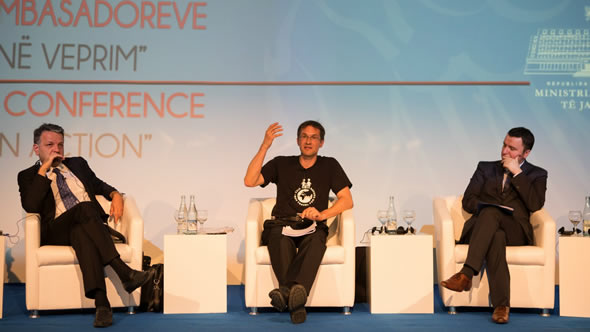
In January 2014 ESI organised a brainstorming in Paris with members of the European Commission's Directorate-General responsible for enlargement, diplomats from the Swedish Ministry of Foreign Affairs and from the Dutch Ministry of Foreign Affairs, together with key experts and officials from the Balkans. In our invitation we set out this agenda:
"In this brainstorming at the Swedish Embassy in Paris the discussion will focus on the core practical question of how the annual progress reports can best promote reform efforts in candidate and potential candidate states:
Who reads the progress reports now? How are they now being used? How can they help reformers – inside the countries but also outside? How can they help change perceptions in such critical member states over time? How to be "strict and fair" and accessible? How can they set an agenda for debate as effectively as the OECD Pisa reports? How to produce and then use "roadmaps" for individual chapters that allow producing score cards of concrete annual progress? How can one improve the more general sections on political and economic criteria in the progress reports?"
ESI Power point presentation: Motivation, competition and the future of Progress Reports (Paris 2014)
Participants felt that this was the right moment for an initiative to revive the accession process by changing the annual progress reports in such a way as to better motivate civil servants, politicians and civil society in countries aspiring to membership. Participants also agreed that many sections of current progress reports were hardly read by anyone, and not understood even by diplomats who had the task of summarising them for their national parliaments. Progress reports should be clear, not vague.
This meeting was followed by an ESI presentation at DG enlargement staff retreat (Away day) on 29 January 2014 upon the invitation of the director general, Christian Danielsson:
Power point presentation: Enlargement until 2020
Background document: Presenting European Commission Assessments – Based on previous progress reports
On 30 January 2014 ESI's Kristof Bender presented these ideas in Zagreb at a meeting of "Balkans in Europe Policy Advisory Group."
On 31 January 2014 ESI's Gerald Knaus published a blog post with a proposal for a new generation of progress reports. On the same day he presented our proposal for a new generation of progress reports in Rome to members of the "White List Project" Advisory Board, chaired by former Italian prime minister Giuliano Amato.
Participants of ESI Rome brainstorming included:
- Cengiz Aktar, professor of political science, author and columnist
- Giuliano Amato, former Italian prime minister and interior minister, former chairman of the ESI White List Advisory Board
- Charles Clarke, former UK Home Secretary, member of the ESI board
- Burak Erdenir, Deputy Under-Secretary at the EU Ministry of Turkey
- Iulian Groza, Deputy Foreign Minister of Moldova
- Lars Wahlund, Ambassador of Sweden to Turkey
Gerald next presented these policy ideas next in Ankara on 7 February 2014 at a meeting with seven EU ambassadors to Turkey – Poland, Portugal, Sweden, Slovenia, Denmark, Netherlands, and Austria – as well as to the head of the EU delegation and to Turkish officials.

ESI presentation: Ankara 7 February 2014 (Swedish ambassador's residence)
On 27 February 2014 ESI sent out a newsletter arguing for a new generation of progress report:
"The paradox is that the EU has never needed a credible enlargement policy more than it does today: not just for Eastern Europe, but for the Balkans and Turkey as well.
At the same time, the EU – and the European Commission – struggle to keep enlargement credible even for countries where the promise was made years ago.
EU enlargement policy is only credible to accession countries – from Albania to Turkey – if it is seen to be fair. It is acceptable to publics in EU member states – from the Netherlands to Germany – only if it is seen to be strict."
"This proposal is informed by the ongoing success of strict, yet fair visa liberalisation processes, the OECD's Pisa assessments for education, and other experiences of credible assessments and rankings. This would involve the European Commission doing for each policy area (chapter) – and for each accession country - what it has done in the recent visa liberalisation process: produce one document that clearly sums up what the core requirements – the core acquis – are under each chapter that every accession candidate should meet. They could look like visa liberalisation roadmaps.
These requirements should focus on outcomes: not just to pass a law, but also to "pass a law, have a credible institution and implement it." They should be assessed annually in the progress reports for all seven countries. Some of this the Commission is already doing.
There is enormous power in credible, objective assessments to mobilise reformers and civil society in accession countries. This would also show when countries move backwards. It could help set the reform agenda and restore the trust of EU member states in European Commission evaluations. Building the institutions needed in many of these policy areas is also the best way to strengthen the rule of law – from public procurement policy to inspection services in the fields of industrial standards, environment or food safety.
For countries whose primary source of FDI lies in the EU and whose hope of catching up economically lies in exporting much more to the EU, the largest market in the world, making credible progress here is also a strong signal to investors. Finally, it would allow fair implementation of the "more for more" principle, as donors (and pre-accession funding) can be targeted on rewarding objectively assessed reform efforts in specific policy fields."
On 6 March 2014 Gerald spoke in a brainstorming on the EU accession process organised by the Dutch Ministry of Foreign Affairs in The Hague. Participants included senior diplomats from the Netherlands, Belgium and Luxemburg.
On 26 March 2014 the Consulate General of Sweden in Istanbul and ESI organised a brainstorming on "Recharging accession policy – a policy proposal" with leading members of Turkish civil society.
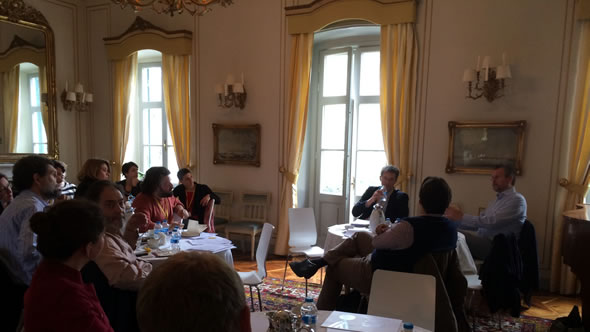
A brainstorming event for members of Turkish civil society (Istanbul, 26 March 2014)
On a same day ESI's Alexandra Stiglmayer held a briefing with representatives of Serbian think-tanks and NGOs in Brussels.
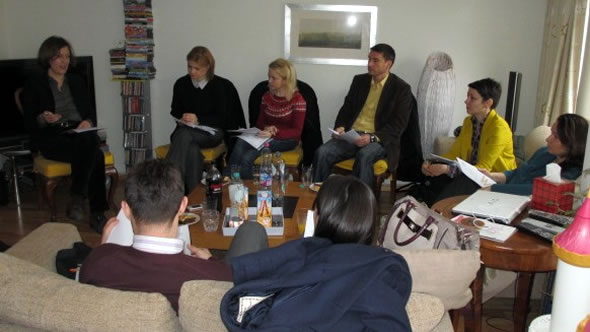
Alexandra speaking to representatives of Serbian NGOs (Brussels, 26 March 2014)
On 11 April 2014 Gerald presented these proposal on the future of progress reports in Warsaw at the Ministry of Foreign Affairs of Poland. On 24 April 2014 Gerald spoke at the conference "Ten years after the 2004 enlargement - Achievements and next steps" in Vienna. And on 30 April 2014 Gerald was invited by Swedish ambassador to Croatia to present ESI's proposal for new progress reports in Zagreb to Ambassadors of the United Kingdom, Austria, Hungary, the Kingdom of Netherlands, the European Commission, other EU and Croatian diplomats, analysts and politicians, including Foreign Minister Vesna Pusić and the foreign policy advisor of the Croatian prime minister.
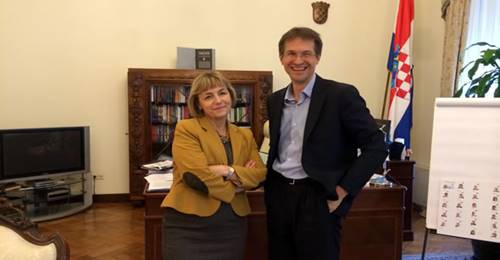
Gerald speaking to EU ambassadors and Croatian officials (Zagreb, 30 April 2014)
In May 2014 Gerald published a blog post in two-parts on why Macedonia is not Finland, setting out the importance for reforms of the PISA studies, rankings and competition.
On 5 June 2014 Gerald presented ESI's proposal for future of progress reports in Skopje at an event organised by CRPM and Konrad Adenauer Stiftung on "Is enlargement over? And does it matter?" At the invitation of the Dutch ambassador Gerald also presented our proposals to European ambassadors.
On 12 June 2014 Gerald participated in the ECFR's annual Council Meeting in Rome and shared ESI's publications on the issue with many European policy makers.
On 18 June 2014 Gerald proposed in a blog post for all Balkan countries to take the OECD PISA test and for the European Commission to include its results in its Progress Reports.
On 25 June 2014 Alexandra briefed 20 young government officials from the Western Balkans on the need to reenergize and reform the enlargement process.
On 4 July 2015 Gerald took part at the annual Ambassadors' Conference in Tirana and gave a presentation on ESI's proposal for the progress reports to Albanian ministers and diplomats.

Gerald speaking at the annual Albanian ambassadors' conference (Tirana, 4 July 2014)
On 10 July 2014 Gerald presented ESI's proposals at the 2014 Croatia Forum in Dubrovnik on "EU Integration of Western Balkans: State of Play".
On 17 July 2014 Kristof briefed the Visegrad Group's foreign ministers in Bratislava on ESI's new ideas how to reenergize the EU accession process.
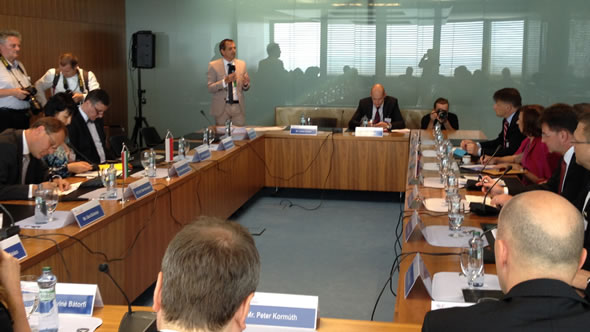
Kristof briefing with Visegrad Foreign Ministers (Bratislava, July 2014)
On 17 July 2014 ESI published a new report on Macedonia "Vladimir and Estragon in Skopje. A fictional conversation on trust and standards and a plea on how to break a vicious circle." This was followed by a newsletter analysing the collapse of trust in EU enlargement policy:
"Today trust in enlargement policy is declining everywhere: in EU member states, in candidate countries, among those who govern and those in opposition. In the past five years opposition to enlargement has deepened in every single EU member state, old and new, rich and poor, those hit hard by the global economic crisis and those relatively unscathed.
A recent survey (autumn 2013) shows that an absolute majority of EU citizens oppose further enlargement (52 per cent). Opposition is even stronger among euro area respondents (60 per cent). The fall in support for enlargement is sharpest in traditionally pro-enlargement countries such as Italy (where opposition to enlargement increased by 22 percentage points) or Spain (21). The recent changes in Cyprus, the Czech Republic and Slovakia are also dramatic.
Many people in EU member states question the central premises of the pre-accession process: that it is a powerful tool for transformation, capable of accelerating reforms in candidate countries so they become fit for accession in the foreseeable future. And can enlargement really be a win-win policy that makes the EU stronger without such a transformation?"
On 22 September 2014 Gerald was invited by the Lithuanian Ministry of Foreign Affairs to speak at a seminar in Vilnius dedicated to EU Enlargement policy: "More than a continent: OUR (open, united, robust) EUROPE".
Vilnius Background note: why Progress Reports have to change
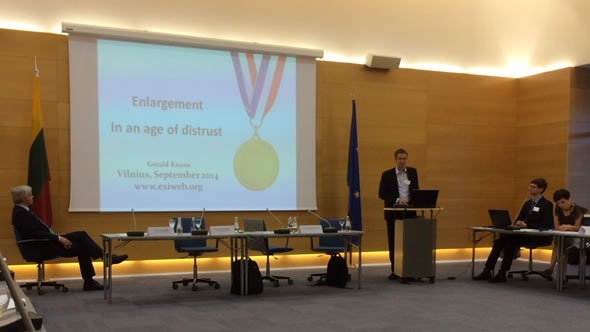
Gerald presenting our proposals at the Lithuanian foreign ministry (Vilnius, September 2014)
This was followed by an ESI seminar on how one might apply the proposed new methodology to Chapter 18 (Statistics), organised on 2 October 2014 in the Ministry of Foreign Affairs in Stockholm:
The idea of the workshop is to discuss two concrete proposals:
How could a set of meaningful economic indicators help establish clearly whether a country is moving towards being a "functioning market economy", and can thus be considered meeting the Copenhagen economic criteria? How can such indicators be defined in a way that is considered both sufficiently strict in EU member states and fair in accession countries … and which both inspires the right policy debates in countries and allows for comparisons, thus encouraging positive regional competition and mutual learning?
How can such an effort be supported by a pilot project in the field of Statistics (chapter 18) and an improvement of the annual monitoring of progress by the Commission? How to best draw up a roadmap setting out the acquis in this field, modelled on the visa liberalisation roadmaps developed by DG Home, which had such a strong impact on reform efforts?
The aim of the workshop is to find ways to increase the trust in the enlargement process in EU member states, while finding ways to help policy makers encourage reform efforts irrespective of the formal status of countries in the EU accession process.
Participants included Gjergji Filipi, Director General, INSTAT (Institute of Statistics of Albania), Helena Alvin, Strategy and Policy Unit at DG Enlargement, Jens Olin, Swedish Statistical Office, Mikael Elofsson, Head of unit for Western Balkans and Turkey, SIDA, Johan Berglund, Deputy Director, EU Department, and many others.
Gerald also met with Swedish government ministers. On 3 October 2014, he travelled to Visby for the annual Visby conference organised by the Jarl Hjalmarson Foundation. Participants included Carl Bildt, Swedish Minister for Foreign Affairs, Boris Nemtsov, Former Russian Deputy Prime Minister, Toomas Hendrik Ilves, President of Estonia, and others.
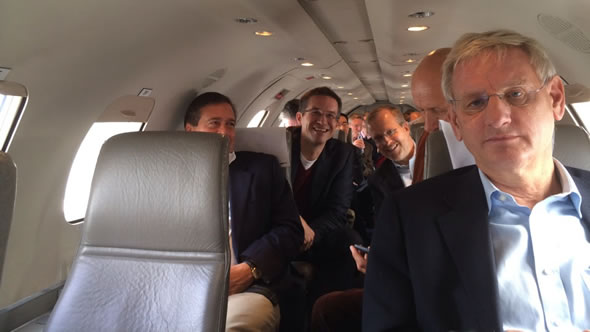
Gerald on the way to Visby (Sweden, 3 October 2014)
On 29 October 2014 Kristof presented our proposals on the future of European integration in the Balkans to the Balkans in Europe Policy Advisory Group (BiEPAG) in Vienna.
On 31 October and 1 November 2014 Kristof spoke at a workshop on "EU Enlargement Strategy in the Western Balkans: Effects on the Rule of Law" hosted by the ETH Zurich.
On 7 November 2014 Gerald presented our progress report reform ideas at an Inter-Parliamentary Conference for the Common Foreign and Security Policy and the Common Security and Defence Policy (IPC-CFSP/CSDP) at the Palazzo Madama, the seat of Italian Senate in Rome.
On 7 November 2014 Kristof spoke in Sarajevo at a conference about "A new impetus for the European integration of the Western Balkans." Other speakers were Jean-Eric Paquet, director for Albania, Bosnia and Herzegovina, Serbia and Kosovo at DG Enlargement, and Jan Kickert, political director at the Austrian Ministry of Foreign Affairs.
On 18 November 2014 Gerald presented our ideas at three events on EU-Turkey relations in Ankara (at TOBB University of Economics and Technology) and Istanbul organised by the Istanbul Policy Center (IPC).
On 27 November 2014 ESI organized a high-level workshop on the future of the EU pre-accession process in Belgrade together with Serbian deputy prime minister Kori Udovicki.
The Belgrade presentation by Gerald is available online.
On 2 December 2014 Gerald presented the ESI reform proposal in Paris at the Centre d'études et de recherches internationales (CERI) at the conference "European Integration of the Balkans – What Now?"
On 3 December 2014 Gerald spoke in The Hague at a conference organised by The Hague Institute for Global Justice: "Making a Difference: European Union and the Rule of Law in the Western Balkans". He also met senior Dutch government officials.
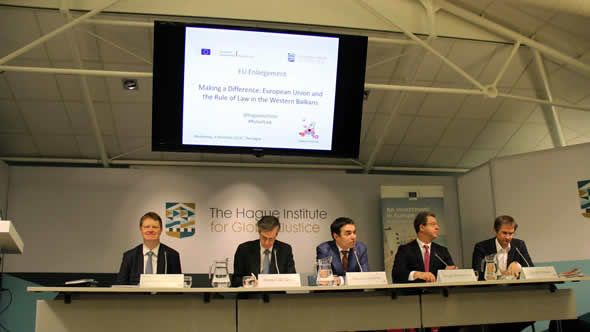
Gerald presenting ESI's proposals at The Hague Institute (The Hague, 3 December 2014)
On 4 December 2014 Gerald spoke about the future of the Balkans at the NATO Defense College in Rome to senior military officers and their civilian equivalents.
On 29 January 2015 Gerald was invited to a panel in Zagreb on "Sharing of expectations, experiences and lessons learnt of 20 years of EU membership of Austria, Finland, and Sweden". He wrote a background paper for the conference based on ESI's ideas for a reform of the progress reports.
Background paper: Enlargement has a glorious past. How about the future?
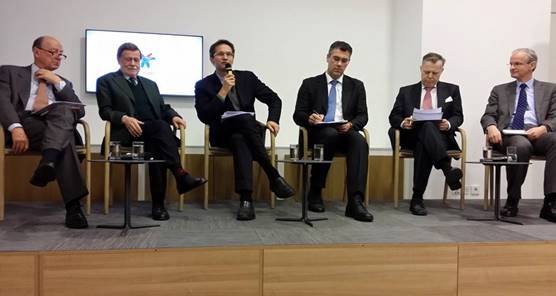
Gerald discussing lessons for future of enlargement with three former chief negotiators (from Austria, Finland and Sweden) in Zagreb in January 2015.
On 30 January 2015 ESI organised a brainstorming at the Swiss Embassy in Paris for senior officials from the Commission and the Swedish International Development Cooperation Agency (SIDA) to discuss the future of EU enlargement. Gerald, Kristof and Adnan Cerimagic, presented a number of ESI papers. The debate was chaired by Simon Mordue, Director for Strategy and Turkey in DG NEAR, who played a leading role in the reform of enlargement methodology.

ESI's brainstorming at the Swiss embassy in Paris (30 January 2015)
ESI Paris Paper – Twelve ideas for 2015 / ESI Dummy Progress report
On 2 February 2015 Gerald went to Stockholm for a series of meetings with Stats Sweden, SIDA and the Swedish Ministry of Foreign Affairs to discuss how to develop ESI's proposal for the reform of the enlargement process.
On 12 February 2015 Gerald and Adnan presented these ideas for feedback in Sarajevo to different representatives of civil society, politicians and diplomats.
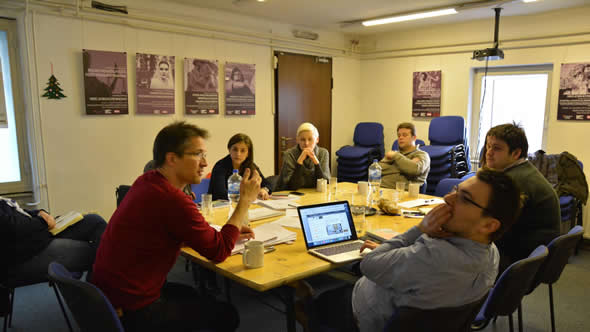
Gerald in discussions with members of the Bosnian civic sector (Sarajevo, 12 February 2015)
From 18 to 21 March 2015 Adnan presented ESI's proposal for the reform of the enlargement process to members and the secretariat of the European Parliament.
On 19 March 2015 ESI published a discussion paper on "Measuring corruption – The case for deep analysis and a simple proposal." In a newsletter sent on a same day we noted:
"Every year in its annual progress reports the European Commission discusses corruption in all seven accession countries. It notes that even the best laws, the shiniest anti-corruption agencies and the longest anti-corruption action plans are only means to an end. The end of anti-corruption policies should be impact and measurable results.
But can the incidence of corruption in different walks of social life be fairly established? Can the impact of anti-corruption reforms be measured? In a new discussion paper we argue that the European Commission has a very powerful tool at its disposal which has not yet been used with the accession countries."
On 27 April 2015 Kristof presented our case for reforms of accession methodoology in Tirana.
On 4 June 2015 Gerald returned as lecturer to the NATO Defense College in Rome. ESI also met senior Italian officials.
Throughout this time ESI analysts met many times with senior EU officials and EU parliamentarians in Brussels as well as with diplomats and ministers from EU member states in Berlin, London, Paris and Vienna.
